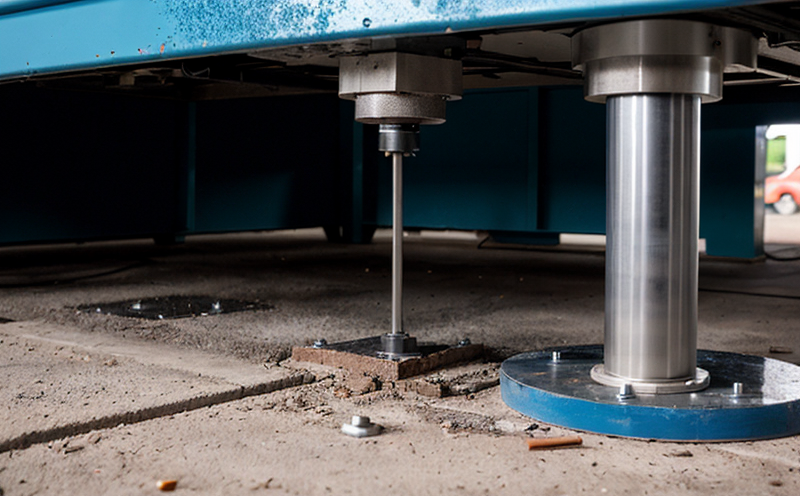ASTM D3410 Distortion Testing in Composite Materials
The ASTM D3410 standard provides a method to measure distortion and residual stress in composite materials. This testing is critical for ensuring the integrity of components used in aerospace, automotive, and sports equipment industries where high performance and reliability are paramount. Understanding how these materials behave under various loading conditions allows manufacturers to optimize design and material selection.
Distortion testing involves subjecting specimens made from composite materials to mechanical loads or thermal treatments designed to induce stress within the structure. The deformation resulting from this process is then measured using sophisticated equipment capable of detecting minute changes in shape and size. By analyzing these deformations, engineers can assess the extent of residual stresses induced during manufacturing processes such as curing, pressing, or winding.
One key aspect of ASTM D3410 testing lies in its ability to pinpoint areas prone to failure due to excessive internal stress concentrations. When combined with other non-destructive evaluation techniques like ultrasonic inspection or X-ray imaging, this data helps identify weak points that might not be visible through visual inspection alone.
Another important consideration is the influence of environmental factors on composite performance. Exposure to temperature variations and moisture can significantly alter a material's properties over time. ASTM D3410 testing accounts for these changes by simulating real-world conditions where possible, thereby providing more accurate predictions about long-term durability.
Standardized procedures outlined in ASTM D3410 ensure consistency across different laboratories performing similar tests. This standardization is essential when comparing results between facilities or sharing findings with international partners who adhere to the same guidelines. Compliance with such standards enhances confidence in the quality and reliability of products based on composite materials.
Understanding how each component interacts within a larger system requires comprehensive knowledge of not only individual material properties but also their collective behavior under various operating conditions. Through rigorous testing like that specified by ASTM D3410, manufacturers gain valuable insights into potential weaknesses in design and production methods that could lead to premature failure or reduced lifespan.
For industries relying heavily on composite materials, such as aerospace and automotive manufacturing, accurate measurement of distortion and residual stress is crucial for maintaining safety standards while optimizing performance. Employing ASTM D3410 testing ensures compliance with industry regulations and contributes to the development of safer, more efficient products.
Why It Matters
The importance of ASTM D3410 distortion testing cannot be overstated for several reasons. Firstly, it plays a vital role in ensuring product quality by identifying any defects or inconsistencies that could compromise structural integrity. Secondly, it helps maintain regulatory compliance which is crucial for businesses operating within specific industries like aerospace and automotive manufacturing.
By accurately measuring distortions caused by internal stresses during production processes, manufacturers can make informed decisions regarding material selection and process optimization. This leads to improved product performance and extended service life, ultimately resulting in cost savings and increased customer satisfaction.
Furthermore, ASTM D3410 testing supports continuous improvement efforts within organizations by providing valuable feedback on current practices. Manufacturers can use this information to identify areas for enhancement or modification, leading to more robust designs capable of withstanding harsh operational environments.
In conclusion, ASTM D3410 distortion testing is essential for maintaining high standards of quality and safety across various industries. It enables companies to produce reliable products that meet strict regulatory requirements while also fostering innovation through ongoing improvements in design and manufacturing processes.
Eurolab Advantages
At Eurolab, we pride ourselves on offering comprehensive services tailored specifically for your needs. Our team of experienced professionals ensures that every aspect of ASTM D3410 distortion testing is conducted with precision and accuracy, adhering strictly to international standards.
We utilize state-of-the-art equipment capable of detecting even the smallest distortions in composite materials. This allows us to provide precise measurements necessary for accurate stress analysis. Our facilities are equipped with advanced thermal chambers that simulate real-world conditions, ensuring our results accurately reflect how your products will perform under various environmental factors.
Our commitment to quality extends beyond just performing tests; we also offer detailed reporting and interpretation of results, providing actionable insights into the performance characteristics of your composite materials. Whether you're looking for initial validation during product development or ongoing monitoring throughout production cycles, Eurolab can meet all your requirements with reliability and efficiency.
Choosing Eurolab means partnering with a trusted expert who understands both the technical demands of ASTM D3410 testing as well as its broader implications for business success. Our dedication to excellence ensures that you receive the highest quality service available, contributing significantly towards achieving your goals in terms of product quality and safety.
Environmental and Sustainability Contributions
The field of additive manufacturing (AM) is rapidly evolving, driven by increasing demand for lightweight materials that offer improved strength-to-weight ratios. Composite materials play a crucial role in this advancement due to their ability to combine multiple properties into one material system. However, proper characterization of these materials throughout the design and production processes is essential.
One way AM contributes positively to sustainability is by reducing waste associated with traditional manufacturing methods. By precisely depositing only what is needed for each part using AM technologies like 3D printing, excess raw material can be minimized significantly compared to conventional machining techniques which often produce large amounts of scrap.
Incorporating ASTM D3410 distortion testing into the production process allows manufacturers to ensure that their composite parts maintain optimal geometrical accuracy despite any inherent manufacturing tolerances. This precision helps prevent issues like warpage or翘尾





